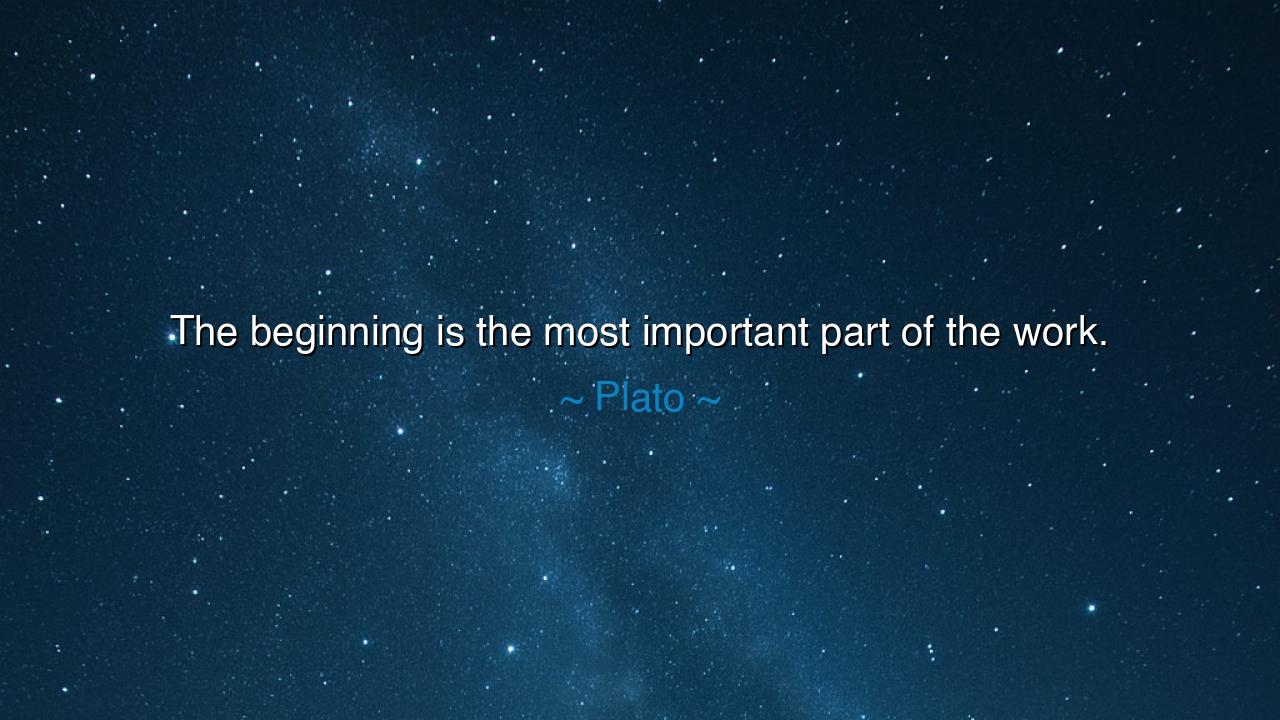
The beginning is the most important part of the work.






Hearken, O seekers of wisdom and the craft of endeavor, to the words of Plato, the philosopher whose insight shaped the ages: "The beginning is the most important part of the work." In this utterance lies the ancient truth that the foundation of any endeavor determines the course and character of all that follows. To begin with care, clarity, and purpose is to lay a path toward success, harmony, and fulfillment.
In the theater of human endeavor, many are eager to rush into action, yet Plato illuminates that thoughtful beginnings shape destiny. The first steps of a project, the initial strokes upon a canvas, the opening lines of a discourse—each carries the weight of the journey to come. To neglect the beginning is to invite disorder, confusion, and faltering, for the opening is the root from which all achievement grows.
The ancients, who chronicled the labors of heroes, artisans, and sages, understood the sacred power of the first act. The warrior’s preparation, the farmer’s sowing, the builder’s foundation—each taught that care in commencement produces strength and endurance. The seed planted with intention bears fruit more abundant than that cast carelessly, and the soul that engages fully at the outset sets the tone for all effort.
Yet this teaching carries subtle depth: beginnings require both vision and discipline, the marriage of aspiration with method. Plato’s insight urges the seeker to embrace the sacredness of the opening moment, to invest thought, energy, and moral focus at the threshold of endeavor. In doing so, one transforms mere action into purposeful labor, and chance into destiny.
Therefore, O children of purpose and diligence, let this teaching lodge in your hearts: the beginning is not mere prelude, but the cornerstone of all work. In attending to it with care and foresight, one sets the path for enduring success, cultivates strength, and honors the timeless wisdom of the ancients, whose lives testify that the first step, wisely taken, guides all that follows to triumph and fulfillment.






DPDung Pham
This quote resonates with me because it highlights the critical nature of starting strong. If the beginning is done well, it often propels you through the rest of the work. But what if the beginning is less than perfect? Does it mean the whole process will suffer? How do you ensure that the initial stages are done right, especially when starting a long or complex task?
QHTang Quoc Huy
Plato's emphasis on the importance of the beginning makes me wonder if we sometimes overcomplicate things in our minds before starting. Often, the hardest part is not the work itself, but overcoming the mental barrier to just begin. How do you get past that hesitation and take the first step? Do you think having a clear vision of the end goal can help make that first step easier?
NBNhon Bao
I completely agree with this quote because the beginning of any task or project can shape its entire course. The initial planning, mindset, and approach are critical. But what happens if we start on the wrong foot? Can a poor beginning ever be corrected, or do we have to start all over? How important do you think it is to refine your beginning to avoid unnecessary setbacks down the road?
DPKhanh Hien Do Pham
Plato’s quote really makes me think about the power of starting something. It’s easy to get caught up in the details or the end goal, but the beginning sets the foundation for everything that follows. Have you ever had a project where you struggled to start, but once you did, things started to fall into place? How do you motivate yourself to take that first step, especially when the task feels daunting?